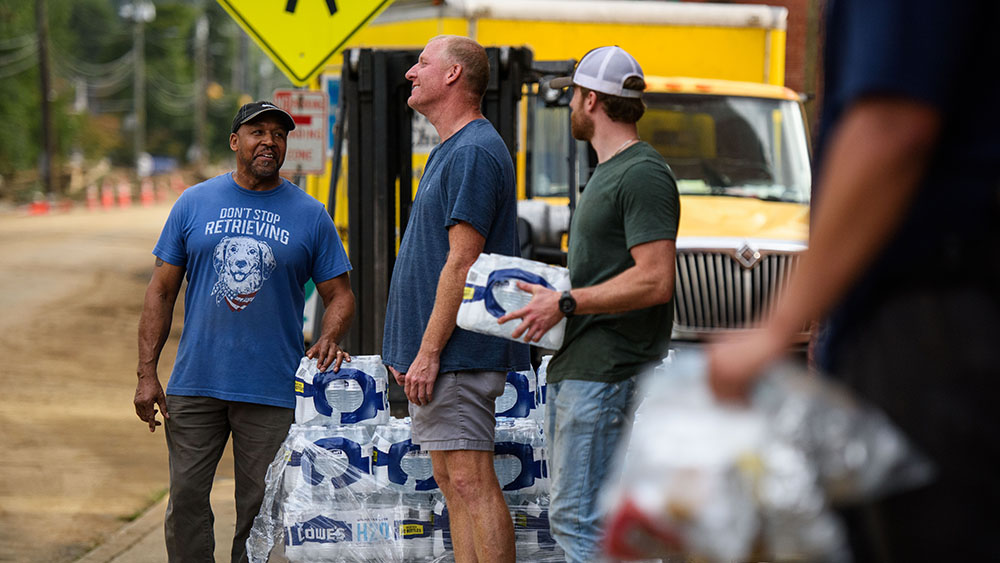
- Hurricane Milton caused widespread destruction, but it also highlighted the inherent resilience and adaptability of both nature and human beings as described in this episode of "Decentralize.TV."
- Stories like the surviving raccoons and regrowing banana trees illustrate nature's capacity for recovery and resilience, providing powerful examples of perseverance.
- In the face of adversity, community members in Florida came together, emphasizing the power of human unity and collective response to disasters.
- The conversation focused on the book "Natural Intelligence" by Cory Endrulat and Jim Gale, advocating for the integration of natural wisdom into human lives, encouraging sustainable and self-reliant practices to build resilient communities.
- It underscored the transformative potential of resilience, inspiring people to rebuild stronger communities and find innovative solutions, fostering personal and social evolution.
Amid the destruction and chaos of Hurricane Milton, the resilience of both nature and human beings shines through. The storm's fury, which devastated homes, communities and ecosystems, has also revealed an incredible capacity for recovery and growth.
Through stories like Todd Pitner's surviving raccoons and Jim Gale's banana trees quickly regrowing leaves, people see the profound lessons in perseverance and adaptability that nature imparts.
During a recent episode of "Decentralize TV," the Health Ranger Mike Adams discussed with co-host Pitner and guests Gale and Cory Endrulat their personal experiences with the hurricane and how they embody the principles of resilience in their lives.
Pitner, whose home suffered significant damage, was elated to discover that his beloved raccoons not only survived but were unharmed. This moment of hope and renewal exemplifies the natural resilience that even the most unexpected creatures possess.
Gale's banana trees provide another powerful illustration. Although the trees faced severe damage from the storm, within days they were sprouting new leaves. This rapid regeneration demonstrates the intrinsic strength and adaptive nature of plants, which can recover from seemingly catastrophic setbacks. It is a testament to the regenerative power of nature, an essential reminder of its enduring resilience.
Endrulat, who experienced flooding and power outages in his community, highlighted the resilience of his food forest and the community's collective response. In the face of adversity, people came together to support one another, demonstrating the power of human unity and the potential for individual action to make a significant impact. (Related: Creating food forests out of front lawns can prepare communities for FOOD COLLAPSE – Brighteon.TV.)
"It is incredible resilience. And just the people coming together in Florida with these catastrophes just shows you that people are ready, and they don't need the government to help them," Endrulat stated.
More sustainable and self-reliant practices should be adopted
The guests' conversation revolved around Endrulat and Gale's book "Natural Intelligence," which focuses on the symbiotic relationship between human and natural resilience. Through their work, Endrulat and Gale advocate for the integration of natural intelligence into human lives, encouraging individuals and communities to adopt more sustainable and self-reliant practices.
It involves recognizing the inherent wisdom of nature and learning to harness it for personal and collective well-being. The world around people, with its intricate ecosystems and cycles of growth and renewal, offers abundant lessons on how to endure and flourish.
As the conversation progressed, they discussed the concept of "natural intelligence" as a tool for solving complex global problems. By drawing inspiration from nature's resilience, people can develop sustainable solutions that prioritize health, self-reliance and community cohesion.
The authors advocated for a shift from dependency on conventional authority and artificial systems toward a more natural, self-sufficient way of living. It evolved into a broader dialogue about humanity's potential for positive change.
The guests highlighted the importance of decentralization, permaculture and community organizing as key strategies for building resilient communities. These approaches not only promote environmental sustainability but also foster a sense of ownership and responsibility among individuals.
Ultimately, the discussion underscored the power of resilience, both in nature and within people themselves. The devastation of natural disasters can serve as a catalyst for transformation, inspiring humanity to rebuild stronger, more resilient communities and to find innovative solutions for the challenges people face.
The interplay between human and natural resilience presents an opportunity for profound personal and social evolution. As people continue to navigate the complexities of the modern world, the lessons of resilience derived from nature and human community remind people of the boundless potential for renewal, growth and positive change.
Follow Preparedness.news for more news about being prepared and resilient in times of disasters.
Watch the full conversation between Cory Endrulat, Jim Gale, Todd Pitner and the Health Ranger Mike Adams on "Decentralize TV."
This video is from the Health Ranger Report channel on Brighteon.com.
More related stories:
10 Essential tips for emergency preparedness: Be ready for anything.
Community preparedness: Building networks for support and resources.
Sources include:
Please contact us for more information.














